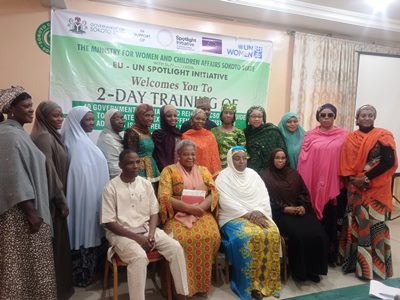By Habibu Harisu
Aishatu Ahmad-Kaoje, the Sokoto State Director of Public Prosecution, (DPP), has urged lawyers and prosecutors to use the Violence Against Persons Prohibition (VAPP) law while handling Gender Based Violence (GBV) cases in the state.
Ahmad-Kaoje made the call at two-day training for 40 government officials and relevant stakeholders on how to operate the sexual offenders register on issues relating to the Violence Against Women and Girls (VAWG) in the state.
The event was organised by the Sokoto State Ministry of Women and Children Affairs, with support from the EU, UN Spotlight Initiative Project.
”The VAPP law is simplified, expanded, clearer and encompassing than the Penal Code Law.
”Using the VAPP law, prosecutors can easily prove cases as required by law. It also categorises violations in at least 30 punishable offences,” she said.
She highlighted some of the major interesting features of the VAPP law that make it unique as well as some of the notable sides for the inclusion of Sexual Offenders Register (SOR) and compensation to victims of GBV.
Ahmad-Kaoje sampled out rape as one of the critical offenses captured by Sokoto VAPP law which entailed any act, expressed or latent intentions involving the use of object or any body part to violate the dignity of others.
She applauded the efforts of the State Gender Based Response Team, saying they have truly lived up to expectations and urged members to sustain the progress.
Earlier, the Permanent Secretary, Sokoto State Ministry of Women and Children Affairs, A’isha Dantsoho emphasised the need for collective efforts toward ending GBV.
Dantsoho said survivors suffered hardships and challenges because most GBV perpetrators remained unpunished.
The permanent secretary emphasised the need for stakeholders to support GBV survivors at all levels and urged them not to be distracted with the challenges encountered.
She said: ”A comprehensive approach will ensure actors render holistic care. I urge survivors not to be distracted.”
”The Sokoto government has ensured proper coordination of all actors contributing to reduce GBV on harmonious platforms which makes work easier and seamless”.
The Lead Facilitator, Mrs Ene Ede, called for collective efforts to ensure maximum success of the SOR is a documentation of reported, arraigned or convicted cases of sex violation as defined by law.
Ede said SOR is a collection of data on those convicted made available to the public directly on the website, while reported, arraigned but not convinced can be accessed based on request.
She said document can be accessible to the public and security agencies while Service Provider Register has the objective of protecting the rights and interest of victims and survivors of the violence.
The facilitator led participants into contents of SOR, agencies responsible for its maintenance, circulations, challenges and other related issues.
She stressed that SOR was obvious due to ever-rising cases of Sexual and Gender-Based Violence in the society and appealed for more stakeholders concern.
In 2019, the Federal Nigerian Government launched its first National Sex Offender Register to name and shame rapists and offenders of other forms of violence against persons across the country.
The register is managed by Nigeria’s National Agency for the Prohibition of Trafficking Persons (NAPTIP) and is funded mainly by the EU.



